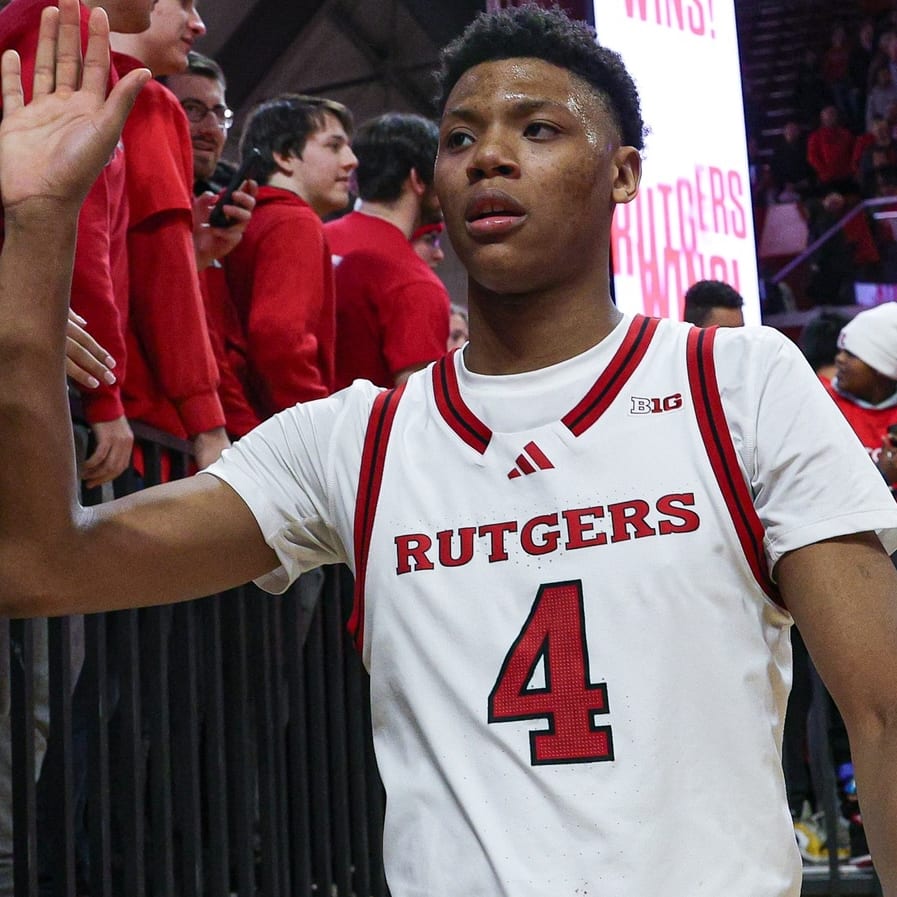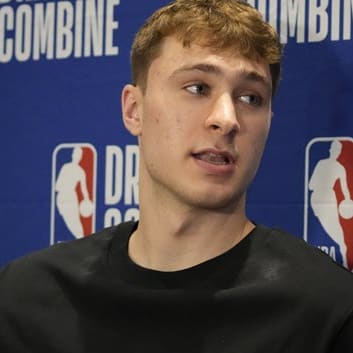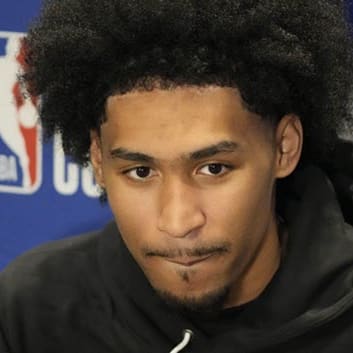This article is part of our The Prospect Post series.
This is part five in a series of articles looking at the fantasy value of players in the 2014 NBA Draft. Each article in this series will focus on a different rookie. In this article, I'll take a look at the fifth overall pick Dante Exum. Here are links to parts 1-4 of the series:
Part 1: Andrew Wiggins (and Introduction)
Part 2: Jabari Parker
Part 3: Joel Embiid
Part 4: Aaron Gordon
The idea behind this series is that rookies have the potential to be great but also the potential to bust. To understand the possible fantasy value of these players, I've developed a reasonable best, average, and worst-case scenario for each rookie based on comparable players' rookie stats. These comparable players either had similar college careers (as identified by hickory-high.com) or are generally given in the media as comparisons for each rookie (e.g. Aaron Gordon is often compared to Shawn Marion).
If you think Gordon is the next Shawn Marion, you can use this series to help you know what that comparison means in terms of fantasy stats, as well how to value those stats in a standard 10-team rotisserie league. Then, when fantasy draft day rolls around, you will know exactly where you want to target these players based on your opinion of who the player will be similar to in the pros.
Dante Exum - Utah Jazz (5th Pick)
Player Comparisons Considered:(Draft Year & Pick)
Penny Hardaway (1993 - 3), Steve Francis (1999 - 2), Kobe Bryant (1996 - 13), Ricky Rubio (2009 - 5), Victor Oladipo (2013 - 2), James Harden (2009 - 3), Brandon Roy (2006 - 6), Tyreke Evans (2009 - 4), Michael Carter-Williams (2013 - 11), Dwyane Wade (2003 - 5), O.J. Mayo (2008 - 3), Russell Westbrook (2008 - 4), Larry Hughes (1998 - 8), Derrick Rose (2008 - 1), Deron WIlliams (2005 - 3), Shaun Livingston (2004 - 4), Dion Waiters (2012 - 4), Brandon Knight (2011 - 8), Jamal Crawford (2000 - 8), Evan Turner (2010 - 2), Jerryd Bayless (2008 - 11), Austin Rivers (2012 - 10)
Compared to the other top prospects in the 2014 draft, relatively little is known about Dante Exum. When I started writing this article, I set out to learn everything the internet knew about Dante Exum. Here's what I found:
- He's a tall point guard from Australia. DraftExpress has him listed at 6-6.
- In July 2013, Exum led Team Australia to the semifinals of the FIBA Under-19 World Championships, before losing to the US Team 94-51.
- He has a twin sister, Tierra, and his dad Cecil was a member of the 1982 NCAA championship North Carolina Tar Heels.
- He was the fifth overall pick in the 2014 draft and won't turn 20 years old until after his rookie season is complete.
- According to Chad Ford, Exum tested "off the charts" in psych testing and might be the "most intelligent player" in the 2014 draft.
- Every story that I read about Exum seemed to use the words "mystery","unknown", or "question mark". Some even had phunny headlines, like this ESPN article.
- He was featured in some pretty funny commercials that ran on draft night like this one and this one.
- Prior to draft workouts, most NBA GMs had seen him play only once in person. That was at the Nike Hoops Summit, a year prior to the draft.
- He made some impressive plays in his summer league debut.
This all is my long way of saying that I know very little about how Exum's game will translate to the NBA, and because he has no college stats, there is no statistical method to use for comparing him to other players as I did in parts 1-4 of this series.
Instead, I've shown the rookie season stats of three players that were similar to Exum in position, measurements, strengths, and weaknesses. For a thorough assessment of Exum's strengths and weaknesses go here. The ones I've focused on in my analysis are:
Strengths: elite length, size, and athleticism; a quick first step which allows him to get to the basket
Weaknesses: a long way to go to reach his potential; so-so perimeter shooting.
Admittedly, this approach is more subjective than what I've done with the other rookies, but I hope that the spirit of the work is the same. This analysis will still allow you to pick Exum based on a player that you think he is comparable to, and will also give you a stat line based on that comparison which is adjusted for Exum's situation. Before we look at individual player comparisons, let's take a look at Exum's expected playing time and pace of play.
Minutes Per Game
Exum will be a 19-year-old rookie next season. Here's a table showing all seven of the "guards" who were top-10 picks since 2000, who also played their rookie season as either an 18 or a 19-year-old (courtesy of basketball-reference).
Player | TEAM | Year - PK | MPG |
LeBron James | CLE | 2003 - 1 | 39.5 |
Kevin Durant | SEA | 2007 - 2 | 34.6 |
Bradley Beal | WAS | 2012 - 3 | 31.2 |
Kyrie Irving | CLE | 2011 - 1 | 30.5 |
Dajuan Wagner | CLE | 2002 - 6 | 29.5 |
Shaun Livingston | LAC | 2004 - 4 | 27.1 |
Martell Webster | POR | 2005 - 6 | 17.5 |
Considering how young this group is, I was surprised to see that only one of the seven players played less than 27 minutes per game in their rookie season. The six who averaged over 27 mpg includes greats like LeBron James and Kevin Durant, but Dajuan Wagner is also in the group, so it isn't like this table only includes great players who happened to be 19 years old when they were rookies. Despite his age, there is precedent for Exum to get relatively big minutes next season.
Exum will share the majority of the backcourt minutes in Utah next season with Trey Burke and Alec Burks. Burke and Burks are both young players with upside, but neither have the superstar potential that Exum seems to have, and so it seems unlikely the Jazz would choose to limit Exum's minutes in favor of those two. Based on the Jazz's roster, and the historical precedent of similar players, I think it's reasonable to expect Exum to be in the 28-32 mpg range next season. I've projected him at 30 mpg in all of the scenarios below.
Team Pace
Last season, the Jazz averaged 91.4 possessions per game, the fifth slowest pace in the NBA, well below the league average of 93.9 (per basketball-reference). However, that pace came under the direction of former head coach Tyrone Corbin, who was replaced by rookie head coach Quin Snyder this offseason. Fittingly, we also know very little about Snyder's coaching style, and so, without much else to go on, I've projected a league-average pace for Exum next season.
Best-Case Scenario: Penny Hardaway (Draft: 1993; No. 3)
It's easy to understand why Exum is often compared to Hardaway. Penny was also a tall point guard who excelled at getting into the paint and making plays. They even have some of the same off-the-court similarities, as Hardaway also had his own line of shoe commercials. If Exum becomes anything close to Hardaway, the Jazz will be ecstatic. Before dealing with knee injuries that curtailed his effectiveness, Hardaway made four All-Star teams in his first five seasons and made the All-NBA First Team two times. Check out his rookie season stats, adjusted for the Jazz's pace of play and an average of 30 minutes per game.
Player | MIN | FGA | FG% | FTA | FT% | 3PM | REB | AST | STL | BLK | PTS | Auction Value | Fantasy Rank |
Penny Hardaway | 30.0 | 10.7 | 47% | 3.2 | 74% | 0.5 | 4.3 | 5.3 | 1.9 | 0.5 | 12.9 | $16 | 50 |
This stat line would have ranked in the fantasy top 50 last season and would have been worth $16 in fantasy auctions. The value of this stat line comes mainly from his high levels of assists (5.3 apg) and steals (1.9 spg), while also being close to replacement level in the other categories. No single category in this stat line seems unattainable for Exum, although it would be somewhat surprising if he is able to shoot at such a high field goal percentage (47%) as a rookie.
Average-Case Scenario: Michael Carter-Williams (Draft: 2013; No. 11)
Last season's Rookie of the Year, Michael Carter-Williams, is also a common player comparison for Exum. He too is a long, tall, athletic point guard who at times struggles with his outside shot. Carter-Williams was a surprise to the fantasy world last season, finishing the season ranked in the top 50 despite generally going undrafted in fantasy drafts. Check out his rookie season stats, adjusted for the Jazz's pace of play (slower than the 76ers) and an average of 30 minutes per game (Carter-Williams averaged 34.5 mpg last season):
Player | MIN | FGA | FG% | FTA | FT% | 3PM | REB | AST | STL | BLK | PTS | Auction Value | Fantasy Rank |
Carter-Williams | 30.0 | 12.4 | 41% | 4.3 | 70% | 0.6 | 5.2 | 5.2 | 1.5 | 0.5 | 13.7 | $4 | 83 |
This projection is very similar to the one based on Hardaway's career in points (13.7 ppg vs. 12.9 ppg), rebounds (5.2 rpg vs. 4.3 rpg), assists (5.2 vs. 5.3), blocks (0.5 bpg vs. 0.5 bpg), and three-pointers (0.6 3PM vs. 0.5 3PM). The reason that this projection ranks over 30 spots worse than Hardaway's is because of Carter-Williams' inferior shooting percentages (41% FG vs. 47% FG, 70% FT vs. 74% FT) and slightly lower steal rate (1.5 spg vs. 1.9 spg).
Worst-Case Scenario: Shaun Livingston (Draft: 2004; No. 4)
Livingston entered the NBA draft straight out of high school, and like Exum, there was plenty of uncertainty about what type of player Livingston would be. Livingston was also a tall point guard, 6-7, who had a very high basketball IQ. Before a horrific knee injury, Livingston changed how he played (no link because it makes me sick to watch) [Editor's Note: I'm not as squeamish, so here you go.], Livingston was a very exciting player with a bright future. He was a bit more of a passer and less of a scoring threat than Exum is proclaimed to be. Check out Livingston's rookie season stats, adjusted for the Jazz's pace of play and an average of 30 minutes per game.
Player | MIN | FGA | FG% | FTA | FT% | 3PM | REB | AST | STL | BLK | PTS | Auction Value | Fantasy Rank |
Shaun Livingston | 30.0 | 8.3 | 41% | 2.3 | 75% | 0.0 | 3.5 | 5.9 | 1.2 | 0.4 | 8.6 | $0 | 141 |
You can see from his stat line (specifically 8.6 ppg and 5.9 apg) that Livingston was indeed less of a scorer and more of a distributor than Hardaway and Carter-Williams. Livingston's fantasy value as a rookie came mainly from his assists, although he also averaged a healthy amount of steals (1.2 spg). The reason this projection ranked outside of the top 130 was because of the below-replacement-level production in the scoring categories (8.6 ppg, 41% FG, 0.0 3PM).
My Recommendation For Draft Day
Exum probably has the largest range between his fantasy ceiling and his fantasy floor of any NBA player who will be drafted in fantasy leagues next season. As a result, your strategy for dealing with him in drafts will have much more to do with your risk preferences than with any projection.
For me, I think it's a matter of what type of league you play in. Exum has the potential to be the best fantasy rookie next season because of the categories he is likely to excel in: assists and steals. Remember, I only projected him at 30 mpg. If he gets 33 mpg (which is still less than Carter-Williams) and puts up numbers like Penny, then he would have ranked in the top 30 last season. Therefore, if you play in a 10-team league where players like Arron Afflalo, DeAndre Jordan, and Trevor Ariza went undrafted last season, I would aggressively pursue Exum in the sixth or seventh round of drafts. If he doesn't work out, then I'll hope to be able to pick up a productive guard like Afflalo off of the waiver wire. The upside outweighs the downside in this type of league.
In deep leagues, the downside of drafting risky players like Exum is much greater because waiver wire gems like Ariza don't exist. In these leagues, I would recommend drafting much safer players in the sixth and seventh rounds and letting someone else take the risk on Exum.
Over the next few weeks, a similar breakdown will be provided for several other rookies. You can check back often for new breakdowns to be posted, or you can follow me on Twitter (@MarcFRoberts) for links to the future rookie articles.
If you have thoughts about these projections that you'd like to discuss, or if you'd like me to calculate an alternative scenario, please leave a comment below or contact me on Twitter.










